Top Rankings
Hiawatha Valley Education School District ranks among the top 20% of public school district in Minnesota for:
Category
Attribute
Student Attention
Lowest student:teacher ratio (Top 1%)
For the 2025 school year, there are 4 public preschools serving 77 students in Hiawatha Valley Education School District. This district's average pre testing ranking is 1/10, which is in the bottom 50% of public pre schools in Minnesota.
Public Preschools in Hiawatha Valley Education School District have an average math proficiency score of 20% (versus the Minnesota public pre school average of 45%), and reading proficiency score of 20% (versus the 47% statewide average).
Minority enrollment is 13% of the student body (majority Black), which is less than the Minnesota public preschool average of 42% (majority Hispanic and Black).
Overview
This School District
This State (MN)
# Schools
5 Schools
722 Schools
# Students
125 Students
214,815 Students
# Teachers
13 Teachers
16,916 Teachers
Student : Teacher Ratio
10:1
10:1
District Rank
Hiawatha Valley Education School District, which is ranked within the bottom 50% of all 522 school districts in Minnesota (based off of combined math and reading proficiency testing data) for the 2021-2022 school year.
The school district's graduation rate of 40-59% has increased from 21-39% over five school years.
Overall District Rank
#456 out of 527 school districts
(Bottom 50%)
(Bottom 50%)
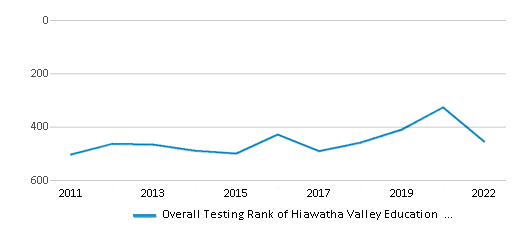
Math Test Scores (% Proficient)
≤20%
45%
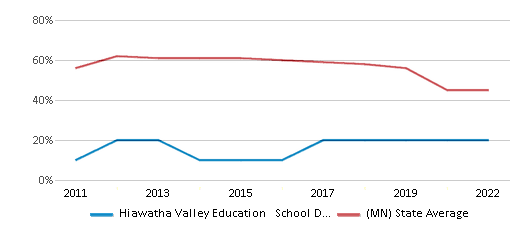
Reading/Language Arts Test Scores (% Proficient)
≤20%
51%
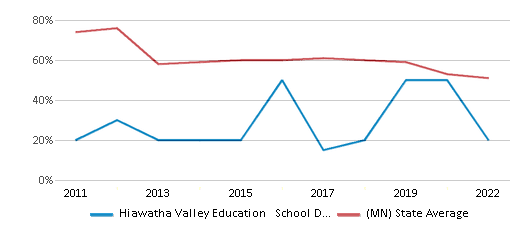
Science Test Scores (% Proficient)
≤20%
41%
Graduation Rate
40-59%
84%
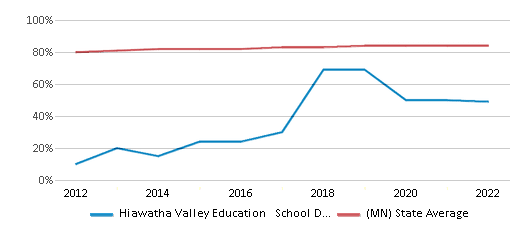
Students by Ethnicity:
Diversity Score
0.21
0.63
# American Indian Students
1 Student
4,606 Students
% American Indian Students
1%
2%
# Asian Students
n/a
15,449 Students
% Asian Students
n/a
7%
# Hispanic Students
4 Students
28,913 Students
% Hispanic Students
3%
13%
# Black Students
5 Students
27,236 Students
% Black Students
4%
13%
# White Students
111 Students
123,893 Students
% White Students
89%
58%
# Hawaiian Students
n/a
300 Students
% Hawaiian Students
n/a
n/a
# Two or more races Students
4 Students
14,418 Students
% of Two or more races Students
3%
7%
Students by Grade:
# Students in PK Grade:
33
24,443
# Students in K Grade:
-
34,761
# Students in 1st Grade:
2
32,541
# Students in 2nd Grade:
2
32,166
# Students in 3rd Grade:
5
29,034
# Students in 4th Grade:
6
28,343
# Students in 5th Grade:
4
24,163
# Students in 6th Grade:
1
7,122
# Students in 7th Grade:
6
1,002
# Students in 8th Grade:
9
940
# Students in 9th Grade:
6
44
# Students in 10th Grade:
10
46
# Students in 11th Grade:
13
48
# Students in 12th Grade:
28
162
# Ungraded Students:
-
-
District Revenue and Spending
The revenue/student of $67,424 is higher than the state median of $17,854. The school district revenue/student has declined by 34% over four school years.
The school district's spending/student of $69,712 is higher than the state median of $18,580. The school district spending/student has declined by 34% over four school years.
Total Revenue
$8 MM
$15,547 MM
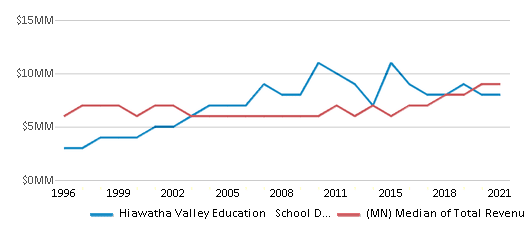
Spending
$9 MM
$16,179 MM
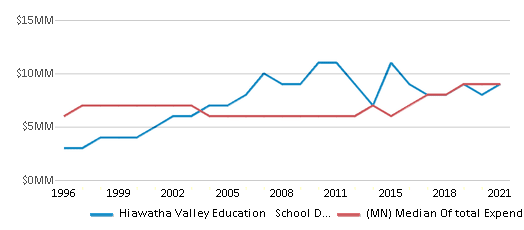
Revenue / Student
$67,424
$17,854
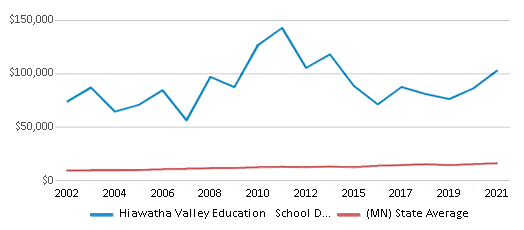
Spending / Student
$69,712
$18,580
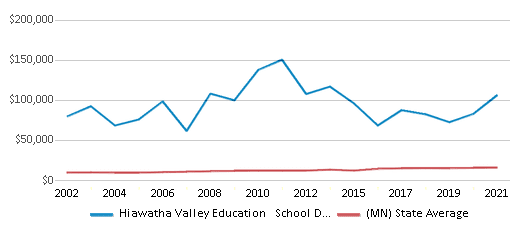
Best Hiawatha Valley Education School District Public Preschools (2025)
School
(Math and Reading Proficiency)
(Math and Reading Proficiency)
Location
Grades
Students
Rank: #11.
Sail Program
Special Education School
(Math: ≤20% | Reading: ≤20%)
Rank:
Rank:
2/
Bottom 50%10
51 Red School Ln
Winona, MN 55987
(507) 474-6882
Winona, MN 55987
(507) 474-6882
Grades: PK-12
| 16 students
Rank: n/an/a
Achieve
Special Education School
211 Main Street
Hokah, MN 55941
(507) 452-1200
Hokah, MN 55941
(507) 452-1200
Grades: PK-12
| 12 students
Rank: n/an/a
Hved Ecse
Special Education School
1410 Bundy Blvd
Winona, MN 55987
(507) 452-1200
Winona, MN 55987
(507) 452-1200
Grades: PK
| 33 students
Rank: n/an/a
Hved Spectrum Program
Special Education School
211 Main Street
Hokah, MN 55941
(507) 474-6882
Hokah, MN 55941
(507) 474-6882
Grades: PK-12
| 16 students
Recent Articles

Year-Round Or Traditional Schedule?
Which is more appropriate for your child? A year-round attendance schedule or traditional schedule? We look at the pros and cons.

Why You Should Encourage Your Child to Join a Sports Team
Participating in team sports has a great many benefits for children, there is no doubt. In this article you will learn what those benefits are.

White Students are Now the Minority in U.S. Public Schools
Increasing birth rates among immigrant families from Asia and Central and South America, combined with lower birth rates among white families, means that for the first time in history, public school students in the United States are majority-minority. This shift in demographics poses difficulties for schools as they work to accommodate children of varying language abilities and socio-economic backgrounds.





